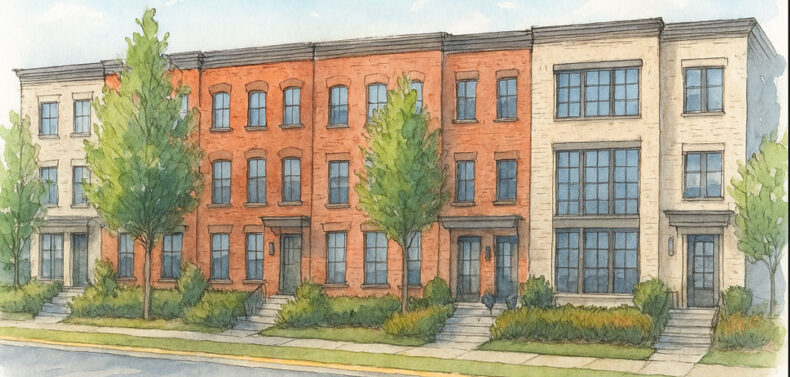Athens has a shortage of more than 6,000 homes, according to one recent study, but Five Points residents can breathe a sigh of relief that no new development is coming to their area anytime soon.
A report by bond rating agency Moody’s Analytics found that Georgia has a deficit of 41,000 owner-occupied homes and 35,000 rental units, according to the Atlanta Journal-Constitution. The shortage is national—the U.S. needs 2 million more homes, and North Dakota is the only state with a housing surplus—but particularly acute in the fast-growing Sun Belt.
Another recent study, by the Georgia Public Policy Foundation, a conservative think tank, used Census data and building permit records to pinpoint the housing shortage in each county. The study found that housing construction has not kept up with Georgia’s explosive growth, particularly since the 2007 mortgage crisis and subsequent recession. For example, Clarke County added about 4,700 housing units from 2010–2020, thousands less than in previous decades. That left Clarke County with a shortage of 6,211 units. In particular, there is a shortage of medium-density “missing middle” housing like townhouses and houses with accessory dwelling units.
The GPPF study cited several factors, including local zoning codes and other regulatory barriers, Wall Street buying up the supply, tariffs on lumber and high interest rates that make homeowners reluctant to sell. “Regulations, high construction costs and labor shortages remain major obstacles,” said Chris Denson, director of policy and research at the GPPF. “But the biggest barrier may be political: We need to build more housing of all types if we want to see significant progress when it comes to affordability.”
Despite the housing shortage, the Athens-Clarke County Commission shot down a townhouse development on Pinecrest Drive near Foley Field, the University of Georgia’s baseball stadium, dubbed “The Grandstands at Foley.” Applicant Synforge LLC requested a rezoning from RM-1 to a slightly more dense multifamily classification that allows 24 bedrooms per acre on the 0.9-acre parcel, rather than 16.
The opposition may have been something of a proxy fight for a new future land use map to guide growth for the next 20 years. “I’ve seen comments online suggesting frustration with the future land use map more so than this rezone. That’s a conversation for another day,” said one of the developers, Kevin Bentley of Macon.
Some Five Points residents have expressed fear that their neighborhood will be upzoned, although the draft version of the map funnels development to underutilized major corridors, not existing neighborhoods. “This is not a corridor,” homeowner Hillary Ruston said. “This is not an area that’s ripe for increased density and development.”
Ultimately, the issue boiled down to five bedrooms—the 14 allowed under the current zoning, or the seven three-bedroom townhouses the developers wanted to build. “These homes are designed for young professionals, retirees and families relocating to Athens who want to live near the university,” Bentley said. Three-bedroom homes are in higher demand than two-bedrooms, he said.
Despite the relatively minor concessions the developers were seeking, neighbors said it would irrevocably change the character of the neighborhood. “We’re going to take what’s there, two houses, and make it 21 bedrooms, which means 21 more cars. These streets are very narrow,” said Five Points resident Edward Kelly.
Some nearby residents wanted more affordable housing built on the tract, with seven figures being bandied about as the price of a condo at The Grandstands at Foley. “It’s for the rich that don’t live here and come and go to games, or for the rich who can pay for students and perhaps have students living there,” Rita Kelly said. “We don’t need the traffic. We don’t need the richness. We need neighborhoods, regular neighborhoods.”
However, as Moody’s Analytics chief economist Mark Zandi told the AJC, without subsidies, high construction costs make luxury apartments and high-end homes more attractive to developers than housing for the middle class. “It’s just not economic for builders to build at that price point because the cost of building is so high,” Zandi said.
Commissioner Melissa Link said the developers should have sought an RS-5 zoning (5,000 square-foot single-family lots) or a density bonus by including affordable housing. “These folks could have gotten that little bit of extra density if they’d gone through our inclusionary zoning process and contributed to our housing fund,” she said.
“Athletes have access to a lot of money these days. I could see this being a serious party center that really disrupts the neighborhood,” Link added.
Affordability was also an issue for planning commissioners when they considered a rezoning for 70 townhouses off Macon Highway on Aug. 9. “As much as I generally support increases in density because Athens badly needs more housing, I do have some concerns here,” planning commissioner Matthew Hall said. Specifically, he said the applicant wants additional density without providing the public benefit of affordable housing through the inclusionary zoning ordinance.
Other concerns included the loss of tree canopy and mill houses on the property. The planning commission voted unanimously to recommend denial when the project comes to the county commission next month.
Like what you just read? Support Flagpole by making a donation today. Every dollar you give helps fund our ongoing mission to provide Athens with quality, independent journalism.










